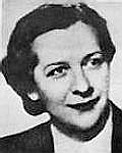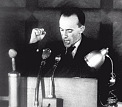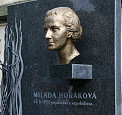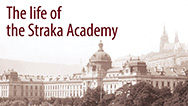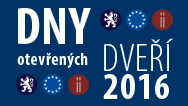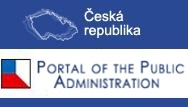Important personalities
27. 6. 2010
27 June 1950 Execution of Milada Horáková
Milada Horáková was born in Prague in 1901, her maiden name was Králová. Her father was an adherent of the Masaryk's Realistic Party; his ancestors were millers on the Sázava River. He himself worked as a sales representative of a pencil manufacturing firm. Her mother came from the town of Kutná Hora from a joiner's family. Her elder sister Marta and younger brother Jiří died of septic scarlet fever in their childhood. At a later time the Král's family gave birth to a daughter Věra.
During the World War One Milada Horáková studied at a grammar school in Korunní Street in Prague; however in 1918 was expelled because of her participation in antiwar demonstrations. She finished her studies at the grammar school in Slezská Street in Prague in 1921 and then she studied at the Faculty of Law at the Charles University in Prague and graduated in 1926. Soon after the finish of the war, she joined the Czechoslovak Red Cross. When she was 21 years old she went down with septic scarlet fever and her near relations feared for her life.
During her studies she met a student of agriculture Bohuslav Horák and they got married after her graduation. Her husband-to-be came from an evangelistic family and thus, under the influence of his, she converted together with her parents to the Moravian Church. Bohuslav Horák worked as an editor of the Czechoslovak Radio and in late 1930' he became a programme director. In 1933 Mr. and Mrs. Horák gave a birth to their sole daughter Jana.
After her studies, Milada Horáková worked at the Central Social Office of the Prague Municipality and later she became a head of the Department for Youth. Her superior was a significant Czech politician Petr Zenkl, later Lord Mayor of Prague, in the postwar period the Chairman of the Czechoslovak National Socialist Party and the Deputy Prime Minister of the Czechoslovak government, in the period 1949-1974 the Chairman of the exile Council of Free Czechoslovakia. Milada Horáková herself was a member of the Czechoslovak National Socialist Party from 1929.
Perhaps the greatest influence of the life of Milada Horáková was the encounter with Františka Plamínková in 1924. It happened at staircase of the Rudolfinum Building, which then served as a seat of the Czechoslovak Parliament., where then student of law was waiting for the opportunity to greet president Tomáš Garrigue Masaryk. Františka Plamínková was a women's right activist, senator and a founder of the Women's National Council; she was executed in 1942 after the assassination of the Deputy Reich-Protecter Reinhard Heydrich. Milada Horáková dared to speak to Františka Plamínková and soon after that she became her collaborator at the Women's National Council and gradually became one of the most significant personalities of that organization. She was dealing in particular with the foreign policy and apart from other things she took part in the conference on codification of the international law in The Hague in 1930. As far as home policy and social problems are concerned, Milada Horáková prepared for example legislative amendments aimed at position of single women and illegitimate children or at improvement of position of women in the family law. In establishing relationships with women's organizations in abroad, she visited many countries.
After the conclusion of the Munich Agreement, she was dealing with problems of Czech expellees from borderland. Immediately after the German occupation she joined the revolt movement; at first she was involved in work for a special legal group, the objective of which was to prepare bases for revolt activities of the Political Centrum and for the Central Political Revolt Leadership. Later, Milada Horáková became a member of a central group, the name of which was Petition Committee "We stay faithful" (her husband was the head of the "agricultural programme group" and he also prepared news for emigrants in London. On 2 July 1940 Mr. and Mrs. Horák were arrested, Milaha Horáková was held for two years in remand of the Gestapo in Prague district Pankrác and in the Charles Square, later she was held captive in the Little Fortress in Terezín and in Leipzig and Dresden. On 23 October she was condemned to eight-year sentence. In the prison in Aichachin in Upper Bavaria she was set free by the American army in spring of the following year.
After liberalization of Czechoslovakia, Milada Horáková became a vice-chairman of the Association of Liberated Political Prisoners; she was elected a member of the provisional National Assembly. She was striving for reviving activities of the Women's National Council but these efforts of hers was as early as then blocked by the communist Ministry of Interior. In her parliamentary speeches, Milada Horáková often dealt with issues of foreign policy and she protested against one-sided orientation towards the Soviet Union proclaimed by communists, and she put emphasis on the fact that Czechoslovakia had to remain a part of large community of nations.
After the February putsch, Milada Horáková was expelled from the Council of Czechoslovak Women and she voluntary resigned her seat in the Parliament. She refused to enter the "revived" Socialist Party; she refused to emigrate as she was convinced that the most important work for her is at home. She started to work in the illegal leadership of the National Socialist Party, in so-called "Political Six". She was arrested on 27 September 1949; her husband managed to avoid arrestment and he was hiding for some time and later he emigrated.
"The Trial Milada Horáková and Others", in which there were accused people of various political orientations, was prepared in particular as a trial during which emigrants and those who had refused to enter the "Revived National Front" were to be accused of "spying for imperialistic powers". A trumped-up lawsuit started on 31 May 1950 and after eight days the jury returned its verdicts; four judgements to death, three life sentences and several other persons were condemned to long lasting sentences from fifteen up to twenty-eight years. Milada Horáková was one of those who were condemned to death. She refused the application for the president's pardon; this application was afterwards submitted by her family; nevertheless, President Klement Gottwald, despite protests of significant world personalities, confirmed the judgement.
Milada Horáková was brutally executed early in the morning on 27 June 1950. The urn with her ashes has been never given to her family. In 1991 President Václav Havel awarded Milada Horáková the Order of the T.G. Masaryk, First Class, in memoriam. The day of death of Milada Horáková became the Commemoration Day of Victims of the Communist Regime.
